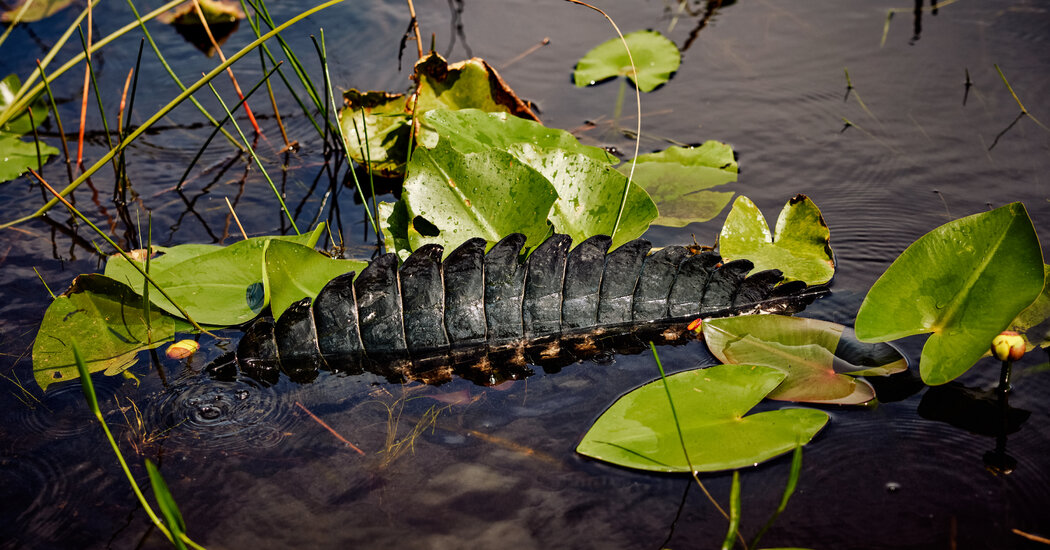
An 11-foot alligator that tipped over a canoe and killed a woman in Central Florida on May 6 served as a reminder that, while alligator attacks on humans are “extremely rare,” as a state wildlife official said, they do happen, sometimes with fatal results.
“This serves as a somber reminder of the powerful wildlife that share our natural spaces,” said Roger Young, the executive director of the Florida Fish and Wildlife Conservation Commission.
Florida had an average of eight unprovoked alligator bites a year over the 10-year period that ended in 2022, according to the commission. Many of them were serious enough to require medical attention.
The commission has been urging people to exercise caution in or near the water during alligator mating season, which runs from early April to June. The risk of an attack is higher, it said, because alligators tend to be more aggressive, active and visible during this time.
The agency and other wildlife commissions offered these tips for avoiding or staying safe around the reptiles, which can grow up to 15 feet long.
Where are they?
Alligators can be found from central Texas eastward to North Carolina, according to the Louisiana Department of Wildlife and Fisheries.
Louisiana and Florida have the largest populations — more than one million each. Georgia has 200,000 to 250,000 alligators and South Carolina is home to about 100,000.
Morgan Hart, the alligator project leader for the South Carolina Department of Natural Resources, believes alligator attacks have increased in the state over the years because of “the sheer growth in human population in the coastal plain of South Carolina.”
When new housing developments are built, artificial lakes are often created with them and then quickly inhabited by alligators.
Be alligator aware.
If you encounter an alligator on land, “you can simply back away from it,” Ms. Hart said.
“Alligators will also hiss if they feel someone is too close and they can’t get away,” she said.
People should be wary of any alligator that approaches, she said, as it may be a sign that it has been fed and associates humans with food.
Humans should also keep at least 30 feet from alligators at all times, according to the Texas Parks and Wildlife Commission.
“They rarely chase people, but they can outrun or outswim the fastest person for the first 30 feet,” the agency said, noting that alligators can sprint up to 35 miles per hour for short distances on land.
Watch your children and dogs closely.
Alligators prefer to pursue prey they can easily overpower.
“Pets often resemble alligators’ natural prey,” said Lauren Claerbout, a spokeswoman for the Florida wildlife commission.
People should keep their pets on a leash and under control, and not allow them to swim or exercise in canals, ponds or lakes that may have alligators.
“The sound of dogs barking and playing may draw an alligator to the area,” the Florida wildlife commission said.
Be careful where you swim.
Wildlife agencies suggest that people swim only in designated areas during daylight hours, and without a pet.
“Alligators are most active between dusk and dawn,” Ms. Claerbout said.
If you encounter an alligator in the water, remain calm and do not approach it, according to the Florida wildlife commission.
Don’t feed them.
It is illegal, and dangerous, to feed alligators in Florida, Georgia, South Carolina and Texas (except during that state’s hunting season).
The Louisiana Department of Wildlife and Fisheries said that people should not throw fish scraps into the water or feed other wildlife in areas where alligators congregate.
“As long as people don’t feed them,” said Donald Houser, the general manager at Gator Park, which is just south of Miami and features shows with alligators. He added that an alligator loses its fear of humans after three days of a person feeding it.
“Just stay away from it, basically,” he said.
How to fight back.
You should fight back against an alligator only if it gets hold of you, officials said.
“In that case, aim for its eyes, nose or throat, which are its most sensitive areas,” according to Everglades National Park in South Florida, adding that people should “hit, kick, or jab with as much strength as you can muster to try and force the gator to release its grip.”
Still, if you are grasped in an alligator’s jaws, there is a slim chance that you would be able to escape, Mr. Houser said.
“You better have someone close that knows what they are doing,” he said.
“Alligators don’t eat people,” he said, but they may bite someone and then spit the person out. By then, it may have held the person under water too long, he said, “and it may be too late.”